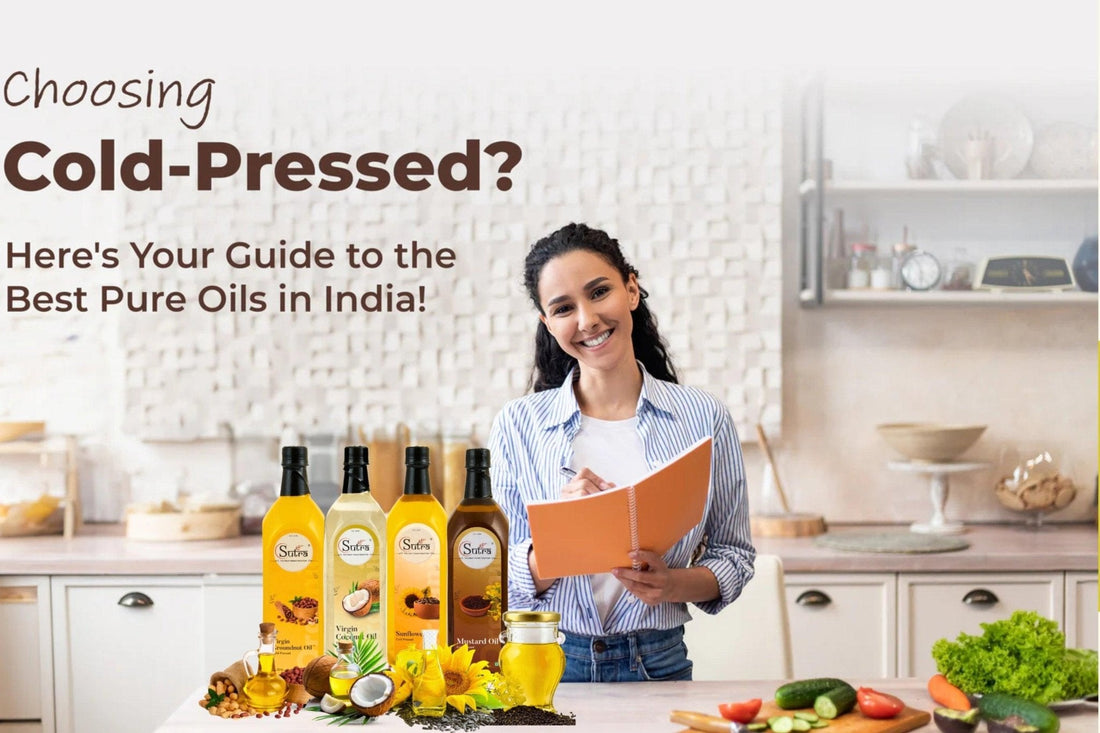Cold Pressed Oils vs Refined Oils – Which One Should You Choose?

Cold Pressed Oils vs Refined Oils – Which One Should You Choose?
In today’s health-conscious world, people are becoming more mindful about what goes into their bodies. One major shift has been the rising popularity of cold pressed oils over refined oils. But what makes cold pressed oils healthier? Are refined oils really that bad? In this comprehensive guide, we’ll compare the two, explore their benefits and drawbacks, and help you choose the best oil for your everyday cooking.
What is Cold Pressed Oil?
Cold pressed oil is extracted from seeds, nuts, or fruits without applying external heat. This process retains all the essential nutrients, antioxidants, and natural flavor of the oil. Cold pressing typically uses a mechanical press or wood-pressed (also known as ghani) methods to extract the oil at low temperatures.
Key Features of Cold Pressed Oils:
- No heat or chemical refining involved
- Rich in antioxidants and nutrients
- Preserves natural aroma and taste
- Ideal for low to medium-heat cooking
Examples of cold pressed oils available at Sutrakart include:
- Cold Pressed Groundnut Oil
- Cold Pressed Coconut Oil
- Cold Pressed Sesame Oil
What is Refined Oil?
Refined oil is produced using high heat and chemical solvents like hexane to extract oil from seeds. These oils are then deodorized, bleached, and chemically altered to improve shelf life and appearance. While refined oils may look “cleaner,” they lose most of their natural nutrients during processing.
Commonly Used Refined Oils:
- Sunflower Oil
- Soybean Oil
- Canola Oil
- Rice Bran Oil
Why Refined Oils Can Be Harmful
Here’s why health experts recommend avoiding refined oils:
1. Loss of Nutrients
During refining, oils are heated up to 200°C, destroying vitamins, antioxidants, and beneficial fatty acids.
2. Trans Fats & Free Radicals
The refining process may generate harmful trans fats and free radicals that contribute to heart disease, inflammation, and cancer.
3. Chemical Residues
Refined oils often contain traces of hexane and other solvents, which can be toxic with long-term consumption.
4. Highly Processed
Refined oils are stripped of flavor, color, and smell—offering nothing but empty calories.
Top 5 Benefits of Cold Pressed Oils
Cold pressed oils are often called “liquid nutrition” for a reason. Here are five powerful health benefits:
1. Rich in Antioxidants
They contain naturally occurring antioxidants like Vitamin E that fight free radicals and slow aging.
2. Supports Heart Health
Oils like cold pressed groundnut oil have heart-friendly fats that reduce bad cholesterol (LDL) and increase good cholesterol (HDL).
3. Boosts Immunity
Cold pressed sesame and coconut oils contain lauric acid and zinc, which strengthen immunity.
4. Aids Digestion
Natural oils are easier to digest and help maintain gut health compared to chemically processed oils.
5. Anti-inflammatory Properties
The absence of trans fats and toxins helps reduce inflammation in the body, supporting joint and brain health.
Cold Pressed Oils for Cooking – Which One Should You Use?
Each cold pressed oil has unique benefits. Here’s how to choose based on your cooking needs:
🔹 Cold Pressed Groundnut Oil:
- Ideal for frying and deep-frying
- High smoke point (~230°C)
- Rich in monounsaturated fats
🔹 Cold Pressed Coconut Oil:
- Perfect for sautéing, baking, oil pulling
- Antiviral and antifungal properties
- Improves metabolism
🔹 Cold Pressed Sesame Oil:
- Great for South Indian recipes and tempering
- Rich in iron and calcium
- Promotes skin and joint health
Is Cold Pressed Oil Suitable for Indian Cooking?
Yes! Cold pressed oils are highly suitable for Indian cooking. They can be used for:
In fact, traditional Indian kitchens have used these oils for centuries before the introduction of refined oils.
Cold Pressed vs Refined Oil – A Quick Comparison Table
| Feature | Cold Pressed Oil | Refined Oil |
|---|---|---|
| Extraction Method | Mechanical pressing (low heat) | High heat & chemical solvents |
| Nutrition | High | Low |
| Shelf Life | Shorter (no preservatives) | Longer (chemically treated) |
| Health Impact | Positive | Potentially harmful |
How to Identify Pure Cold Pressed Oils
To avoid fake oils in the market, follow these tips:
- Check for “Wood Pressed” or “Cold Pressed” on the label
- Look for oils sold in dark glass or tin packaging
- Check for unrefined, unfiltered, no additives
- Buy from trusted brands like Sutrakart
Frequently Asked Questions (FAQs)
Q1. Can I use cold pressed oil for deep frying?
Yes, especially groundnut and sesame oil which have high smoke points suitable for deep frying.
Q2. Is cold pressed oil more expensive?
Yes, but it's an investment in better health. You consume less due to its high potency and flavor.
Q3. Does cold pressed oil taste different?
Yes, it retains the original aroma and taste of the seed/nut – unlike neutral refined oils.
Q4. Is cold pressed coconut oil good for hair?
Absolutely. It's rich in lauric acid and nourishes the scalp, reduces dandruff, and promotes growth.
Final Thoughts – Which Oil Should You Choose?
If you care about long-term health, the choice is clear: cold pressed oils offer far more nutritional value, safety, and authenticity compared to chemically refined oils. Whether it’s for cooking, skincare, or wellness, always opt for oils that are minimally processed.
Explore Sutrakart’s range of pure cold pressed oils and make a healthy switch today!


